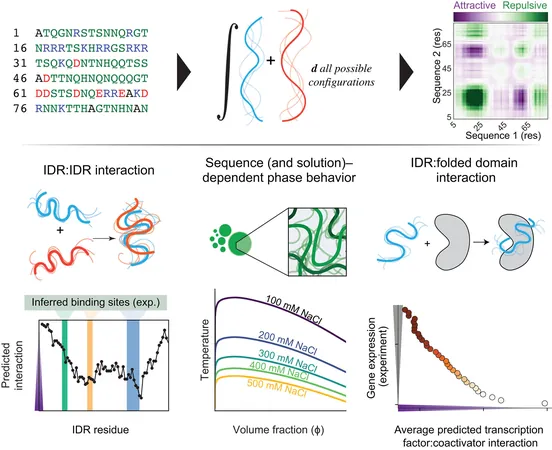
Revolutionary Tool Unravels the Mystery of 'Wiggly' Proteins!
2025-09-04
Author: Wei Ling
Understanding Intrinsically Disordered Proteins: A Game-Changer in Science
In the intricate world of proteins, most carry a well-defined three-dimensional structure that is essential for their specific functions. However, scientists are uncovering the fascinating reality that a significant number of essential proteins—ones crucial to our cellular processes—are not as straightforward; they are 'intrinsically disordered'. These 'wiggly' proteins are constantly shifting, making them a challenge for researchers to study.
While groundbreaking advancements like AlphaFold, the 2024 Nobel Prize-winning computational tool, have revolutionized our understanding of structured proteins, they fall short when it comes to modeling these elusive disordered proteins. This limitation has raised the stakes in biomedical research, as a deeper grasp of these shape-shifting proteins could unveil unknown roots of human diseases and inspire innovative therapeutic strategies.
A Breakthrough in Protein Research: FINCHES
Recent research led by Alex Holehouse, an assistant professor at WashU Medicine, has made significant strides in this area. In a groundbreaking study published in the prestigious journal Science, Holehouse’s team has unveiled a new computational tool called FINCHES—an acronym for First-principle Interactions via Chemical Specificity.
FINCHES analyzes the intricate chemical interactions of proteins' building blocks—amino acids—to predict how disordered proteins might behave. This innovative method focuses purely on chemistry, enabling scientists to model interactions without relying on a defined three-dimensional shape.
The implications of FINCHES are profound: it gives researchers a powerful framework to formulate molecular hypotheses regarding protein activities. This sets the stage for rapid laboratory experimentation, allowing scientists to explore how these disordered proteins function in various critical biological contexts. Notably, this could shed light on how mutations disrupt protein function, paving the way for breakthroughs in understanding diseases like cancer and neurodegeneration.
The Future of Protein Research Looks Bright!
As the scientific community eagerly takes on the challenge of studying intrinsically disordered proteins, tools like FINCHES could be integral in transforming our understanding of proteins and their roles in health and disease. This could mark the beginning of a new era in biochemistry, where the mysteries of 'wiggly' proteins are no longer just a puzzle, but a pathway to innovative medical solutions.




 Brasil (PT)
Brasil (PT)
 Canada (EN)
Canada (EN)
 Chile (ES)
Chile (ES)
 Česko (CS)
Česko (CS)
 대한민국 (KO)
대한민국 (KO)
 España (ES)
España (ES)
 France (FR)
France (FR)
 Hong Kong (EN)
Hong Kong (EN)
 Italia (IT)
Italia (IT)
 日本 (JA)
日本 (JA)
 Magyarország (HU)
Magyarország (HU)
 Norge (NO)
Norge (NO)
 Polska (PL)
Polska (PL)
 Schweiz (DE)
Schweiz (DE)
 Singapore (EN)
Singapore (EN)
 Sverige (SV)
Sverige (SV)
 Suomi (FI)
Suomi (FI)
 Türkiye (TR)
Türkiye (TR)
 الإمارات العربية المتحدة (AR)
الإمارات العربية المتحدة (AR)